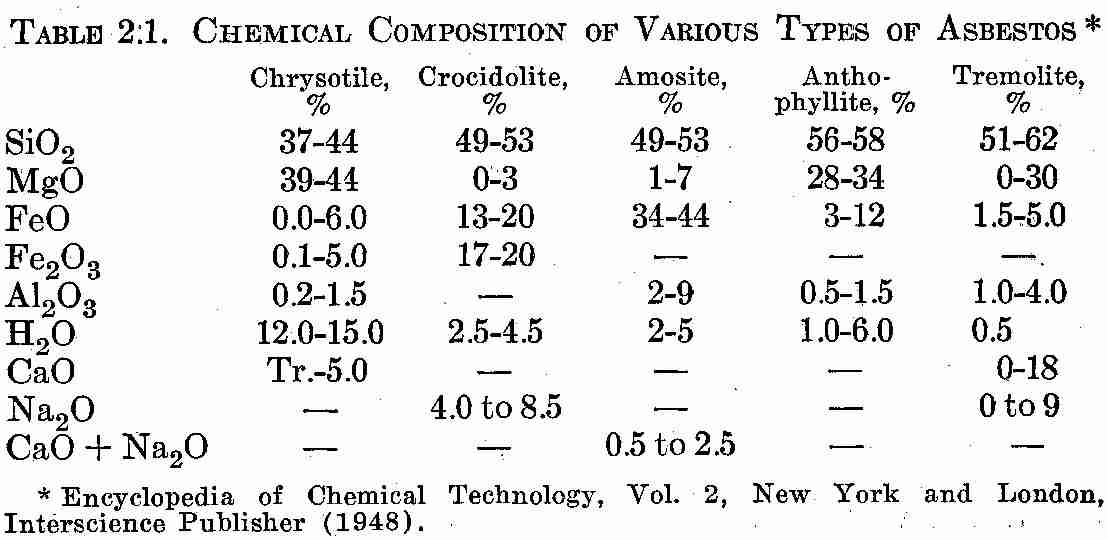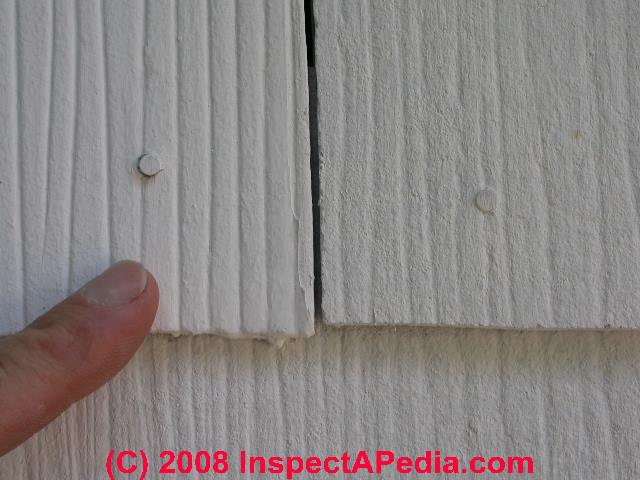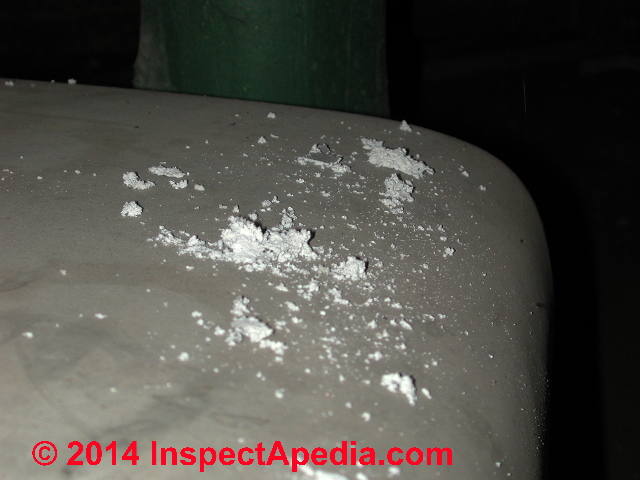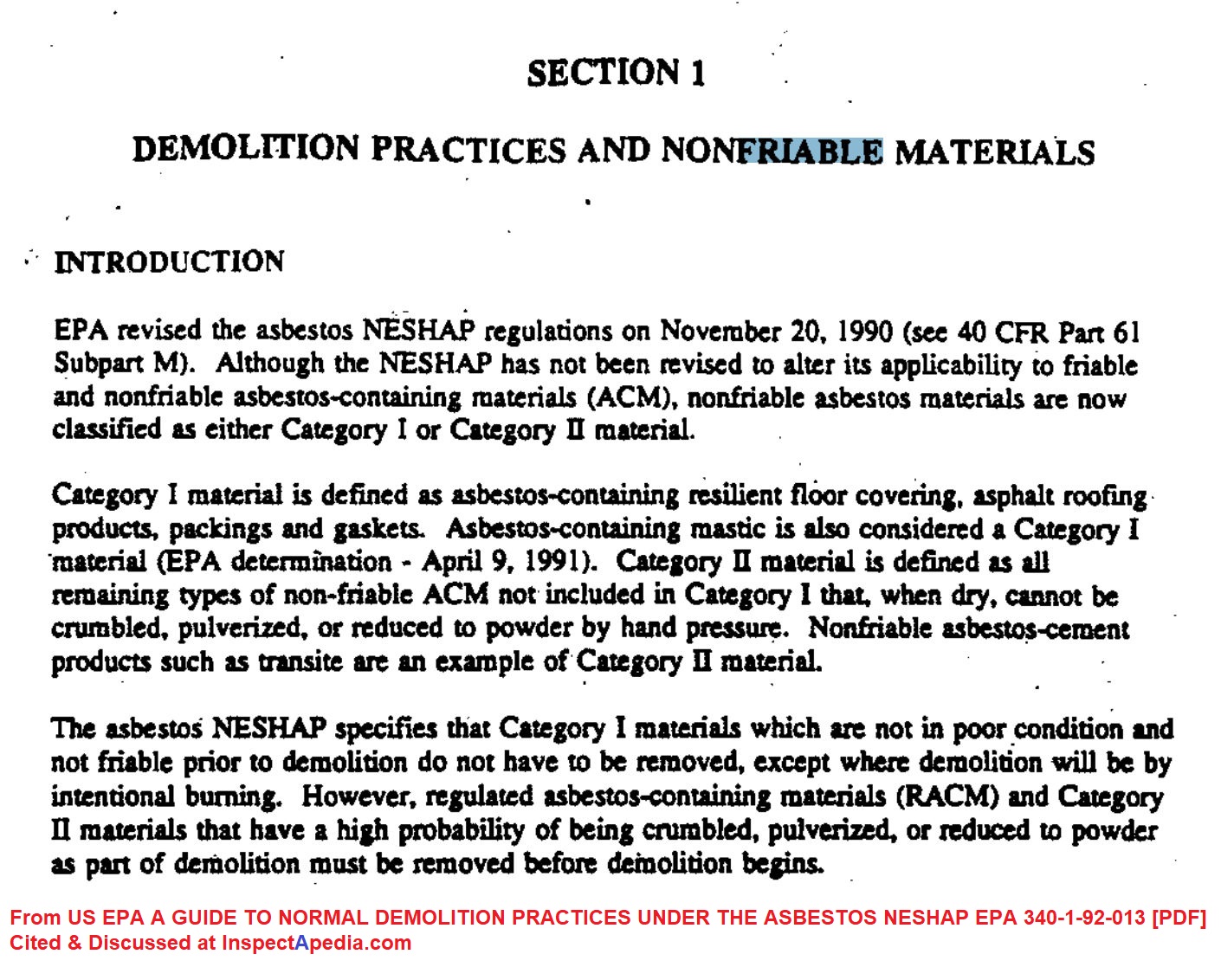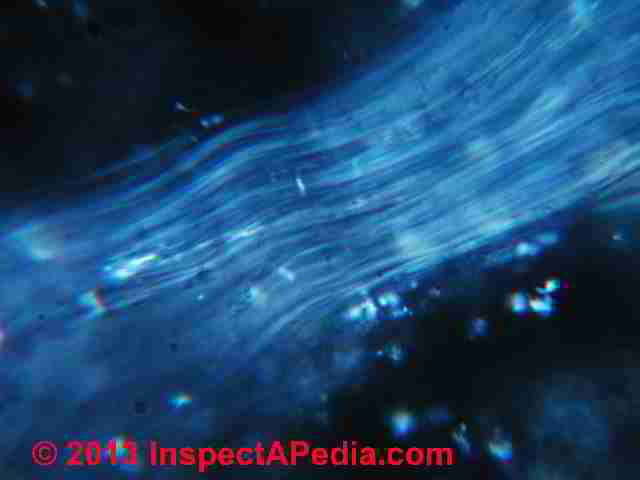 Definition & Chemical Composition of Asbestos
Definition & Chemical Composition of Asbestos
Definition & chemical composition of types of asbestos
- POST a QUESTION or COMMENT about asbestos definition, chemical, mechanical, composition, iron content, thermal & other properties
What is asbestos?
This article gives a definition of asbestos and interestingly, explains that the name asbestos does not refer to a distinct mineral species but it is a commercial term applied to fibrous varities of several minerals differing widely in composition, strength, flexibility, and usefulness.
This article series describes the physical properties of asbestos including its mechanical, chemical, electrical and related properties both in pure asbestos form and when asbestos is mixed with other materials. Page top photo: tremolite asbestos fibers in the microscopy laboratory - ©Daniel Friedman.
InspectAPedia tolerates no conflicts of interest. We have no relationship with advertisers, products, or services discussed at this website.
- Daniel Friedman, Publisher/Editor/Author - See WHO ARE WE?
Definition of Asbestos Fibers
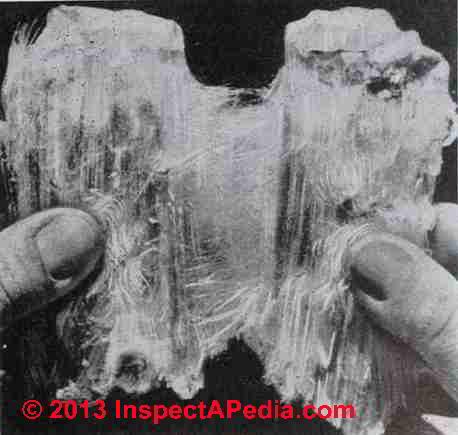 Asbestos is the name given to a number of mineral silicates.
The name asbestos does not refer to a distinct mineral
species but it is a commercial term applied to fibrous varities of several minerals differing widely in composition,
strength, flexibility, and usefulness.
Asbestos is the name given to a number of mineral silicates.
The name asbestos does not refer to a distinct mineral
species but it is a commercial term applied to fibrous varities of several minerals differing widely in composition,
strength, flexibility, and usefulness.
Figure 2.2. View showing parallel fiber structure of asbestos vein, (Courtesy Johns-Manville-Corp.) [Click to enlarge any image]
Chemical and mineralogical studies show that asbestos is of mineral origin. The most important variety is chrysotile, which constitutes approximately 95 per cent of total world prOduction. Its wide use is caused by the fact that its fibers are generally strong, flexible, chemical resistant, and heat resistant.
Other varieties of asbestos are crocidolite, amosite, anthophyllite, tremolite, and actinolite; each has its own field of utility. The chrysotile is classified as being of the serpentine family. The others are of the amphibole family.
The amphibole groups of asbestos minerals were originally known as hornblende, inasmuch as they were closely related to the minerals tremolite and actinolite. This group is made up of complex silicates.
Such varied types of fibers as tremolite and actinolite have widely different chemical structures. Sometimes, it is difficult to identify these different minerals except by x-ray. The amphibole group is interesting insofar as chemical aspects are concerned;, although, weak fibrous structures are present in the group..
Specific gravity of asbestos fibers ranges from 2.5 for chrysotile to 3.3 for the other types.
Chemical Compostion of Chrysotile, Crocidolite, Amosite, Anthophyllite & Tremolite Asbestos
The chemical composition of the various types of asbestos are shown in Table 2.1.
Also see ASBESTOS FLOOR TILE COMPOSITION for an example of distinguishing between use of chrysotile and crocidolite asbestos in products.
TABLE 2.1. CHEMICAL COMPOSITION OF VARIOUS TYPES OF ASBESTOS * [ Click to enlarge or view details]
* Encyclopedia of Chemical Technology, Vol. 2, New York and London, Intérscience Publisher (1948).
The chemical feature common to all asbestos is that they are hydrated silicates The degree of hydration varies from approximately one per cent in some types to as much as approximately 14 per cent in most kinds of chiysotile It generally accepted that asbestos is a metamorphic product derived from certain types of silica-bearing minerals.
Asbestos is generally as dense as the rock in which it occurs but it forms masses of fibers
Definition of Friable & Nonfriable Asbestos Materials
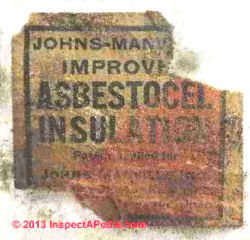 U.S. EPA Definition of Friable Asbestos
U.S. EPA Definition of Friable Asbestos
The US EPA in their "Asbestos NESHAP Adequately Wet Guidance" defines "friable asbestos material" as
Friable asbestos material is any material containing more than 1 percent asbestos as determined using Polarized Light Microscopy (PLM), that, when dry, can be crumbled, pulverized, or reduced to powder by hand pressure. - (EPA p, 3)
Properly defined in plain english, "friable" asbestos means that one can easily produce powdered material, for example by rubbing asbestos pipe insulation between one's fingers to produce a crumbly dust. In this regard your floor tiles are a mix of asbestos and vinyl or asphalt, and are not readily friable.
The definition of friable asbestos is important, because non-friable asbestos-containing material is less likely to be an asbestos hazard in buildings, unless it is mechanically ground or pulverized.
Asbestos is most-hazardous when it is friable. An example of friable asbestos include sprayed-on asbestos insulation.
U.S. EPA Definition of Nonfriable Asbestos Material
The US EPA in their "Asbestos NESHAP Adequately Wet Guidance" defines "nonfriable asbestos material" as
Nonfriable asbestos-containing material is any material containing more than 1 percent asbestos as determined by Polarized Light Microscopy (PLM) that, when dry, cannot be crumbled, pulverized, or reduced to powder by hand pressure. (Op Cit. p. 3)
By this definition, asphalt-asbestos and vinyl-abestos floor tiles are normally and virtually always non-friable materials.
Examples of nonfriable asbestos include asbestos-containing ceiling tiles, floor tiles, roof shingles, siding shingles, and similar "hard" materials. These materials do not release asbestos fibers unless they are disturbed or damaged, for example by drilling into an asbestos-containing ceiling tile or running power equipment or usign other means to aggressively break up and demolish asphalt-asbestos or vinyl-asbstos floor tiles.
Photo below: asbestos cement siding shingles: not friable.
You will see the importance of the distinction between friable and non-friable asbestos containing materials in articles about asbestos removal, encapsulation, or hazard reduction in buildings, such as
at ASBESTOS FLOORING HAZARD REDUCTION
Asbestos is safe and legal to remain in homes or public buildings as long as the asbestos materials are in good condition and the asbestos can not be released into the air. - US EPA [not currently easy to find this source - Ed. 2021]
THE BEST THING TO DO WITH ASBESTOS MATERIAL IN GOOD CONDITION IS TO LEAVE IT ALONE!
Disturbing it may create a health hazard where none existed before. - U.S. EPA, "Asbestos In The Home", retrieved 2021/07/17 original source: https://www.cpsc.gov/safety-education/safety-guides/home/asbestos-home
Photo below: friable asbestos debris from damaged paper asbestos duct insulation.
Watch out: some non-friable asbestos-containing materials such as floor tiles or paper duct insulation become friable either during demolition or in the case of paper asbestos insulating products the material may become friable due to exposure to water or weather.
See examples at ASBESTOS PAPER DUCT INSULATION
Above: Except from EPA's Guide to Demolition Practices (for non-friable asbestos material cateogies and handling), discussed in detail
at ASBESTOS LEFT in PLACE in BUILDINGS - MANAGEMENT GUIDES
...
Continue reading at ASBESTOS FIBER PROPERTIES or select a topic from the closely-related articles below, or see the complete ARTICLE INDEX.
Or see these
Recommended Articles
- ASBESTOS DEFINITION & COMPOSITION
- ASBESTOS FIBER PROPERTIES
- ASBESTOS in GOOD CONDITION - what to do about it
- ASBESTOS FLOORING LEFT IN PLACE - keep it and cover it
- ASBESTOS FLOORING REMOVAL GUIDE - if you must remove it
- ASBESTOS IDENTIFICATION IN BUILDINGS - home
- ASBESTOS LEFT in PLACE in BUILDINGS - MANAGEMENT GUIDES
- ASBESTOS LIST of PRODUCTS
- ASBESTOS PHOTO GUIDE to MATERIALS
- ASBESTOS PRODUCTS BANNED vs PERMITTED U.S. 2023
Suggested citation for this web page
ASBESTOS DEFINITION & COMPOSITION at InspectApedia.com - online encyclopedia of building & environmental inspection, testing, diagnosis, repair, & problem prevention advice.
Or see this
INDEX to RELATED ARTICLES: ARTICLE INDEX to ASBESTOS HAZARDS
Or use the SEARCH BOX found below to Ask a Question or Search InspectApedia
Ask a Question or Search InspectApedia
Try the search box just below, or if you prefer, post a question or comment in the Comments box below and we will respond promptly.
Search the InspectApedia website
Note: appearance of your Comment below may be delayed: if your comment contains an image, photograph, web link, or text that looks to the software as if it might be a web link, your posting will appear after it has been approved by a moderator. Apologies for the delay.
Only one image can be added per comment but you can post as many comments, and therefore images, as you like.
You will not receive a notification when a response to your question has been posted.
Please bookmark this page to make it easy for you to check back for our response.
IF above you see "Comment Form is loading comments..." then COMMENT BOX - countable.ca / bawkbox.com IS NOT WORKING.
In any case you are welcome to send an email directly to us at InspectApedia.com at editor@inspectApedia.com
We'll reply to you directly. Please help us help you by noting, in your email, the URL of the InspectApedia page where you wanted to comment.
Citations & References
In addition to any citations in the article above, a full list is available on request.
- [1] ASBESTOS HISTORY & PROPERTIES [Book online] D.V. Roasato, engineering consultant, Newton MA, Reinhold Publishing Co., NY, 1959, Library of Congress Catalog No. 59-12535. We are in process of re-publishing this interesting text. Excerpts & adaptations are found in InspectApedia.com articles on asbestos history, production & visual identification in and on buildings.
- [2] "Asbestos in Plastic Compositions", A.B. Cummins, Modern Plastics [un-dated, pre 1952]
- [3] "Asbestos in Your Home," Spokane County Air Pollution Control Authority, Spokane WA 509-477-4727 www.scapa.org provides a one-page image, a .pdf file drawing of a house warning of some possible sources of asbestos in the home. The sources are not ranked according to actual risk of releasing hazardous levels of airborne asbestos fibers and the list is useful but incomplete.
- [4] The US EPA provides a sample list of asbestos containing products epa.gov/earth1r6/6pd/asbestos/asbmatl.htm
- [5] "Characterization of asbestos exposure among automotive mechanics servicing and handling asbestos-containing materials", Gary Scott Dotson, University of South Florida, 1 June 2006, web search 3/9/2012 original source: scholarcommons.usf.edu/cgi/viewcontent.cgi?article=3505&context=etd [copy on file as /hazmat/Automotive_Asbestos_Exposure.pdf ].
- [6] Asbestos Identification and Testing References
- Asbestos Identification, Walter C.McCrone, McCrone Research Institute, Chicago, IL.1987 ISBN 0-904962-11-3. Dr. McCrone literally "wrote the book" on asbestos identification procedures which formed the basis for current work by asbestos identification laboratories.
- Stanton, .F., et al., National Bureau of Standards Special Publication 506: 143-151
- Pott, F., Staub-Reinhalf Luft 38, 486-490 (1978) cited by McCrone
- [6] ASBESTOS IN YOUR HOME U.S. EPA, Exposure Evaluation Division, Office of Toxic Substances, Office of Pesticides and Toxic Substances, U.S. Environmental Protection Agency, Washington,D.C. 20460
- [7] Asbestos products and their history and use in various building materials such as asphalt and vinyl flooring includes discussion which draws on ASBESTOS, ITS INDUSTRIAL APPLICATIONS, ROSATO 1959, D.V. Rosato, engineering consultant, Newton, MA, Reinhold Publishing, 1959 Library of Congress Catalog Card No.: 59-12535 (out of print, text and images available at InspectAPedia.com).
- [8] "Handling Asbestos-Containing roofing material - an update", Carl Good, NRCA Associate Executive Director, Professional Roofing, February 1992, p. 38-43
- [9] EPA Guidance for Controlling Asbestos-Containing Materials in buildings, NIAST, National Institute on Abatement Sciences & Technology, [republishing EPA public documents] 1985 ed., Exposure Evaluation Division, Office of Toxic Substances, Office of Pesticides and Toxic Substances, U.S. Environmental Protection Agency, Washington,D.C. 20460
- EPA ASBESTOS MATERIALS BAN: CLARIFICATION 1999
- Basic Information about Asbestos, US EPA, web search 08/17/2010, original source: http://www.epa.gov/asbestos/pubs/help.html
- "Handling Asbestos-Containing roofing material - an update", Carl Good, NRCA Associate Executive Director, Professional Roofing, February 1992, p. 38-43
- EPA Guidance for Controlling Asbestos-Containing Materials in buildings, NIAST, National Institute on Abatement Sciences & Technology, [republishing EPA public documents] 1985 ed., Exposure Evaluation Division, Office of Toxic Substances, Office of Pesticides and Toxic Substances, U.S. Environmental Protection Agency, Washington,D.C. 20460
- EPA, ASBESTOS IN YOUR HOME [PDF] - U.S. EPA, Exposure Evaluation Division, Office of Toxic Substances, Office of Pesticides and Toxic Substances, U.S. Environmental Protection Agency, Washington,D.C. 20460
- Vermiculite:
Protect Your Family from Asbestos-Contaminated Vermiculite Insulation, U.S. EPA , web search 08/17/2010, original source: http://www.epa.gov/asbestos/pubs/verm.html
Web search 01/20/2011, original source: http://epa.gov/asbestos/pubs/verm_questions.html - Proteja su familia del aislante de vermiculita contaminado con asbesto, U.S. EPA HOJA INFORMATIVA - Proteja a su familia del aislante de vermiculita contaminado con asbestos, web search 08/17/2010, original source http://www.epa.gov/asbestos/pubs/verm-ques-sp.pdf
- [copy on file as /hazmat/Vermiculite_US_EPA.pdf/ Current Best Practices for Vermiculite Attic Insulation - May 2003, U.S. EPA
- [copy on file as] /hazmat/Vermiculite_Health_Canada.pdf] Vermiculite Insulation Containing Amphibole Asbestos - September 2009, Health Canada
- Managing Asbestos in Place, How to Develop and Maintain a Building Asbestos Operations and Maintenance (O&M) Program, U.S. EPA, web search 01/20/2011, original source: http://www.epa.gov/asbestos/pubs/management_in_place.html
- Asbestos Strategies, Lessons Learned about Management and Use of Asbestos: Report of Findings and Recommendations on the Use and Management of Asbestos, 16 May 2003, US EPA, web search 01/20/2011, original source: http://www.epa.gov/asbestos/pubs/asbstrategiesrptgetf.pdf
prepared by the: Global Environment & Technology Foundation, 7010 Little River Turnpike, Suite. 460, Annandale VA 20003 - Other US EPA Publications on asbestos: web search 01/20/2011, see http://www.epa.gov/asbestos/pubs/pubs.html
- In addition to citations & references found in this article, see the research citations given at the end of the related articles found at our suggested
CONTINUE READING or RECOMMENDED ARTICLES.
- Carson, Dunlop & Associates Ltd., 120 Carlton Street Suite 407, Toronto ON M5A 4K2. Tel: (416) 964-9415 1-800-268-7070 Email: info@carsondunlop.com. Alan Carson is a past president of ASHI, the American Society of Home Inspectors.
Thanks to Alan Carson and Bob Dunlop, for permission for InspectAPedia to use text excerpts from The HOME REFERENCE BOOK - the Encyclopedia of Homes and to use illustrations from The ILLUSTRATED HOME .
Carson Dunlop Associates provides extensive home inspection education and report writing material. In gratitude we provide links to tsome Carson Dunlop Associates products and services.


